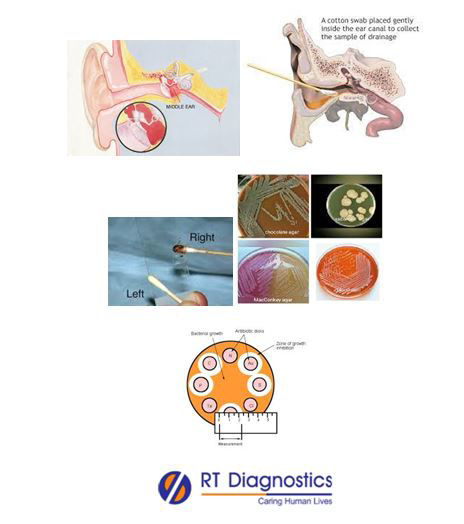Culture & Sensitivity – Ear Swab:
Why Culture and sensitivity (Ear Swab) Test?
CLINICAL INFORMATION
Common ear infections are caused by pathogens like bacteria (staphylococci), fungi ( Aspergillus, Candida), viruses, etc. Risk factors of ear infection include trauma to the ear – causing infection to the outer ear (otitis externa) and/or infection with a ruptured eardrum, chronic skin conditions eg.eczema, co-morbid conditions like diabetes mellitus, swimming in contaminated water, lack of cerumen or wax in-ear, water sports, etc. An ear drainage culture is a lab test where a cotton swab is used to collect specimens from inside of the outer ear canal for culture and checks for any growth of microbes on a culture media. The sample specimen taken for the test may include fluid, pus (eg. in case of CSOM- Chronic Suppurative Otitis Media), (cerumen) wax, or blood in case of discharge. Culture and Sensitivity (Ear Swab) test helps to screen, detect and confirm the causative agent in case of an ear infection (eg. bacterial or fungal infection - otomycosis, etc). The test results can detect some of the complications if associated with the ear infection (mostly in the ear canal) due to certain skin conditions (i.e like flaky skin etc) such as psoriasis, eczema, acne, etc, allergic conditions like rhinitis, asthma, the weak immune system in conditions such as diabetes, chemotherapy (for cancer treatment), etc. Clinical signs and symptoms for ear swab culture and sensitivity includes signs of inflammation, tinnitus (ringing in the ear), hearing loss, feeling of fullness in the ear, redness of the outer ear, itching, severe pain in the inner ear, unpleasant foul-smelling purulent discharge from the ear(s), discharge like blood, fluid (discharge from the ear can be white, yellow, gray, black or green, etc) and/or pus, etc. Additional tests are examinations on an otoscope by an ENT physician etc. Other tests include tests on sample specimen like blood, urine, stool for infection, other tests for ear examination includes Lempert’s endaural speculum (to open the ear canal), Seigle’s pneumatic speculum (gives magnification to view the ear canal to test the mobility of the tympanic membrane to look for perforations) – to perform fistula test for vestibular function, ear irrigator, audiometer, hearing tests such as tuning fork test, pure-tone testing, bone conduction test, tymphanometry, acoustic reflex testing, auditory brain stem response, otoacoustic emissions, etc. These tests help in differential diagnosis to rule out conditions such as acoustic neuroma, conductive hearing loss, sensorineural hearing loss, tinnitus, vertigo, damage to the vestibulocochlear nerve (8th cranial nerve responsible for hearing and balance, etc).

General Instructions:
Sample Requirement: Specimen - Blood sample collected from the Ear Sample (Swab). Test Preparation: None.
NOTE - Sample for specimen collections may vary based on the patient’s condition/cases according to the patient’s presenting complaints/signs or symptoms:
SPECIMEN REQUIREMENT (Special or Rare Cases) - As instructed and guided by Physician / Clinician / Pathologist / as per Laboratory’s requirements, according to procedures and protocols.
Sample Requirement: Blood Sample taken from the Ear Sample (Swab)
Test Preparation: None
This Multi-Specialty Clinical Referral Laboratory RT DIAGNOSTICS provides precise and accurate tests with an extensive range of testing services to the medical centers to help in the diagnosis and identification of pathology in the test specimens for infectious diseases and also to evaluate the function of organ systems of the patient. It prevents further complications and helps to stabilize and restore health to near normalcy at the earliest without delay.



